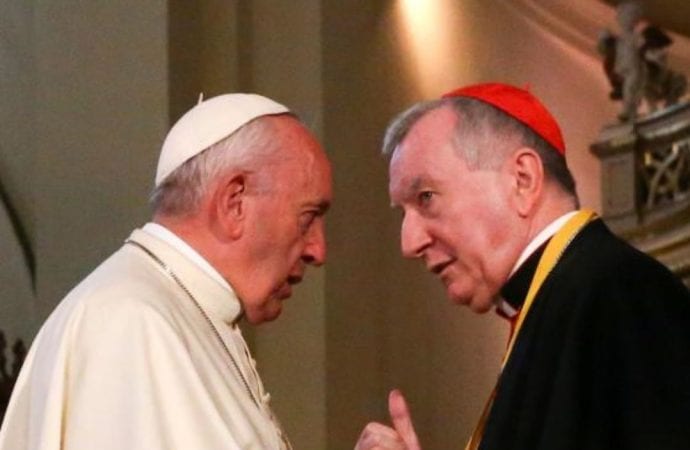After nearly 6 years of work, it looks like the new governing constitution of the Vatican should be published by the end of the summer.
On Saturday, the Spanish publication Nueva Vida will publish an article outlining some of the changes in the document, called Praedicate Evangelium, which Crux reported on earlier this week.
The big news is that the once-dominant Congregation for the Doctrine of the Faith (CDF) is being effectively demoted. A new “super-dicastery” for evangelization will be given pride of place in the new order, with another “super-dicastery” for charity also superseding the CDF in the new Vatican hierarchy.
The document also reveals that Pope Francis will be further amalgamating Vatican offices into single “dicasteries,” a process already begun with the creations of the Dicastery for Communication, Dicastery for Integral Human Development, and Dicastery for Laity Family and Life.
According to Honduran Cardinal Oscar Rodriguez Maradiaga, the coordinator of the Council of Cardinal Advisers that helped draft the document, the new apostolic constitution “offers to the people of God a new and brave perspective of reform in the spirt of Francis.”
Right now, the draft of Praedicate Evangelium is with the bishops’ conferences around the world for comment, so the final text won’t be ready until at least June.
But one thing seems clear: The Vatican’s Secretariat of State will be the unchallenged 800-pound gorilla in the Vatican.
At the beginning of Francis’s pontificate, it was widely believed the Vatican’s Secretariat of State would be cut down to size in any reform of the Vatican Curia.
The office runs the Holy See’s diplomacy and is the channel through which the bishops’ conferences communicate with the Vatican. In addition, it performs a function as moderator of the Church’s central bureaucracy, effectively arranging the appointment of high-ranking officials in other Vatican offices.
When Francis was elected, Cardinal Tarcisio Bertone was Secretary of State, and his tenure was viewed by most Vatican observers as disappointing at best, fueling speculation that the secretariat would be given a purely diplomatic function in the future.
In the earliest reforms, the pope established two new offices bearing the once-exclusive name “secretariat” - for the economy and for communication - which was supposed to highlight their equality with the Secretariat of State.
However, under Bertone’s successor Cardinal Pietro Parolin, the Secretariat of State has not only squashed any putative plans of a downgrade, but like Obi Wan Kenobi, it has become “more powerful than you can possibly imagine.”
Traditionally, the CDF was a check on the secretariat’s power, since it could put a hold on Vatican documents to clear up any doctrinal ambiguity. Under Francis, the CDF has often been sidelined, and under Praedicate Evangelium this change in status will become official.
The two new secretariats have also been put on a more subservient footing. The communications office was re-designated a dicastery last year, and the Secretariat of the Economy - leaderless since its prefect, Cardinal George Pell, left Rome in 2017 to unsuccessfully fight a charge of historic sex abuse - is widely acknowledged to lack the authority to wield effective power.
In fact, so far it seems Praedicate Evangelium will have little to say about the stalled financial reforms of the Curia. Although the Vatican has made a lot of progress in fighting money laundering and other corrupt practices in its financial institutions, such as the Vatican Bank, it has been less successful in introducing modern budgeting, auditing, and procurement standards in its various offices.
This is another battle where the Secretariat of State is seen as the victor, since it bristled at having outsiders nose through its books.
(Another winner is the Congregation for the Evangelization of Peoples - commonly referred to by its former title “Propaganda Fide” - out of which the new “super dicastery” on evangelization will grow. Responsible for “mission territories” in the Church, the office appoints bishops, runs seminaries, and has its own vast financial holdings and properties in Rome and the rest of Italy. It, too, jealously guards its ledgers.)
There is another consequence of Praedicate Evangelium that will also benefit the Secretariat of State.
Fewer Vatican offices means fewer archbishops and cardinals to head them, especially if laypeople are put in charge, such as at the Dicastery for Communication. Objectively, this is a good thing. In the past, some Vatican officials saw their position less as doing the work of their office, and more as a means to promote themselves in their career. The new constitution will make this less of a problem.
But in the Byzantine politics of the Holy See, miters matter, and red hats matter even more. The fewer there are walking through the loggias of St. Peter’s, the fewer people who can sidestep the Secretariat of State to get to the pope.
In his comments to Nueva Vida, Rodriguez Maradiaga said “the main point of the new Apostolic Constitution is that the mission of the Church is evangelization,” adding that “the bishops don’t have an ecclesiological position that puts them below those who work in the Roman Curia.”
What he didn’t say was that within the Roman Curia, everyone will now know who’s boss: The Cardinal Secretary of State.

